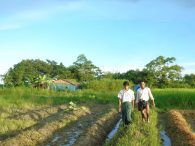
Ye Htut is a member of AFFM from Tha Byay Kone village, Thanlyin Township, Yangon Region. He is a very motivated young farmer who is attempting to develop his area through sustainable agriculture.
Ye Htut graduated from Eco Village Farm (EVF) School, NEED-Myanmar in March 2016. He learned a lot of skills and knowledge about sustainable organic agriculture, community development, and environment. At EVF School, he was given the chance to learn about Permaculture Ethics and Principles that changed his life vision.
In 2012, Ye Htut tried to develop the agriculture sector of his community. He contacted a big company that sells chemical input for the agriculture such as chemical fertilizer, pesticides and hybrid seeds. He became an agent of the company and he had been selling all their products for over 3 years.
In April 2015, he attended a two-week farmer empowerment training conducted by the AFFM in collaboration with NEED-Myanmar. From this training, he learned the concept of basic sustainable organic agriculture and some skills on farming. After this training, he became aware of how chemical inputs on agriculture affects the community sociallly, environmentally, and economically. He stopped selling chemical products and hybrid seeds. He went to attend 10 months intensive program at EVF School to continue studying organic agriculture.
“When I met with AFFM, I don’t have any determination or idea on how to change the life of farmers. I simply became a member because attempting to achieve success in a group is better than doing it alone. After two weeks of training conducted by AFFM, I realized that what I am trying will not solve any problem for the small farmers. So I decided to study more techniques on natural farming,” Ye Htut said.

After graduating from EVF School in 2016, Ye Htut started to organize local farmers for his organic movement. He received funding from one of the joint programs of NEED-Myanmar and Polish Aid. He organized 30 people from 11 villages for this workshop and discussed to them how their current farming practices affect their lives and that they should start doing good farming practices instead. With the help of his friends who are also EVF graduates, he gave discussions on ecology, chemical vs organic, introduced SRI (system of rice intensification), and taught practical skills on growing mushrooms. He also gave hands-on training on how to make compost and natural pesticide for a group of 5 to 10 local farmers.
Ye Htut’s family owns over 12 acres of farmland. During the rainy season, they mainly grow rice paddy, while during winter, they grow green peas. Ye Htut is growing 6 acres of rice without using any chemical inputs. He only uses organic compost. Following him are two other farmers who are growing 6 acres of rice land this year.
Moreover, he organically grows green peas on 12 acres of land. He didn’t use any chemical fertilizer or pesticides. He made natural pesticide himself with the local ingredients that are easily found in the local market at low cost. He was able to save a lot of money, and his farmland is healthy.
“In the beginning, nobody trusted me. They thought my farm will be destroyed by pests or the yield will be decreased,” he said. But at the end of harvesting time, Ye Htut got the same yield with other farmers. He was satisfied with this production rate. Even if he couldn’t produce more than the other farmers, he saved a lot on the cost of chemical fertilizers. While other farmers spent around 400000 Kyats per 10 acres, he spent only 30000 Kyats for buying ingredients to make natural pesticides and fertilizer. He used local raw materials as much as possible.
Together with him, a young farmer, Aung Myo Htet, also grow Green Peas following the same method of Ye Htut. This year, around 10 farmers from different (7) villages will follow him to start growing green peas organically.
“In our area, most of farmers’ children become factory workers. They don’t want to farm and they think farming is not profitable. But in reality, factory workers receive only a small amount of salary. They couldn’t save much money,” Ye Htut expressed his worries on the sustainability of agriculture in their area.

Ye Htut focuses on household economy development and he believes in starting from small scale solutions for sustainability rather than large scale change which is risky.
In 2016, he taught growing two different kinds of mushroom (straw mushroom and sawdust mushroom) to 10 farmers. He has been helping them with monitoring, advising, and also finding a market place for their produce.

Ye Htut is designing his demonstration on integrated organic farm in 3 acres of land, where he has cows, chickens, and turkeys.
“I would like to change the thought of the farmers who are following very old method that has been practiced for many decades. I will show them through my demonstration on integrated farming how we can integrate plant and animals and that there is no waste in this method,” he said.
Ye Hut has already met around 90 farmers through the workshops and individual discussions he conducted. He has conducted many compost training and mushroom training in small groups and individually. He occasionally presents his idea of revolutionary transition of local agriculture to the local people. Over 50 farmers willingly accepted his idea of developing agriculture and household economy. The number of local farmers who are cooperating with Ye Htut and starting to follow his farming methods are steadily increasing in the region.








Comments are closed